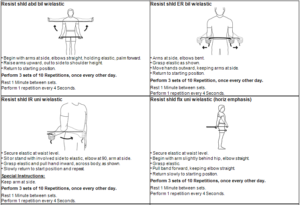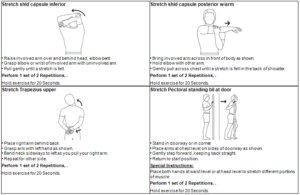Golf and Shoulder Health
Golf and Shoulder Health
Summer is here and for many it is time to hit the links! It is common to have shoulder pain with many activities and golf is no exception. We sustain wear and tear damage to our rotator cuff (deep shoulder muscles) over time, but there are ways to protect our shoulders and continue with the activities that we love.
While working to rehab patients following rotator cuff repair surgery, it is often asked of me ‘when or how can I golf again?’ Here is the advice I give many of my clients:
A well-controlled swing with proper mechanics is safe for your shoulder and can be a great exercise for rotator cuff health. However, too much back swing or excessive follow through does place your rotator cuff at risk for damage. If you have had shoulder surgery and are cleared by your surgeon to resume Golfing, you may want to consider reducing your backswing and follow-through. Keeping your hands in front of your body as much as possible helps reduce the risk and prevent positions that can impinge on your rotator cuff tendons. During the backswing, initiate with hip and trunk motion, followed by shoulder motion.
If your shoulder is getting sore from golfing, you may be experiencing tendinitis leaving the rotator cuff tendons more prone to damage, it may be time to stop playing for the day. If the pain does not go away consider seeing your doctor.
Use a golf cart (motorized or push/pull caddie) and avoid carrying your golf bag with a sore shoulder. If your rotator cuff tendons are aching, they are telling you “enough” and additional strain is not wise. Keep this in mind for which arm you push or pull the cart with. I don’t mind the idea of riding a golf cart either, you still spend the greater portion of your time on your feet, walking, and getting exercise.
Ensure you have proper equipment, avoid clubs that are too short or too heavy. If your range of motion or shoulder rotation is limited because of a shoulder injury, you may need longer clubs.
Exercises you can do at home:
If you have experienced a rotator cuff injury or experience shoulder pain while golfing, use a rolled up towel held under your arm during practice swings (during back swing and down swing) to train you to keep your right elbow close to your body and avoid excess strain on your shoulder.
Rotator cuff targeted strengthening exercises: These are some basic exercises we use in rehab following a rotator cuff injury, whether it required surgery or not and can be used to help prevent serious shoulder injuries:

Shoulder stretches for before a golf outing:

If you feel you have already sustained a shoulder injury, this blog cannot replace the advice from your physician, know when it is time to get it checked out. Preventing shoulder injuries can help keep you in the game. So, keep enjoying the activities you love but always protect your shoulders as you do them.
Nathan Hayes, MSOT, OTR/L

